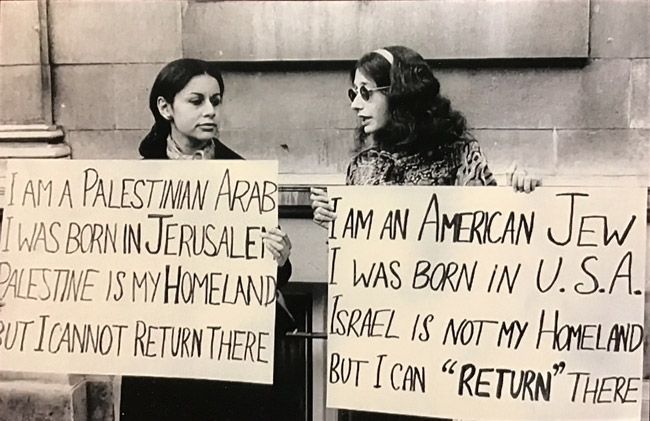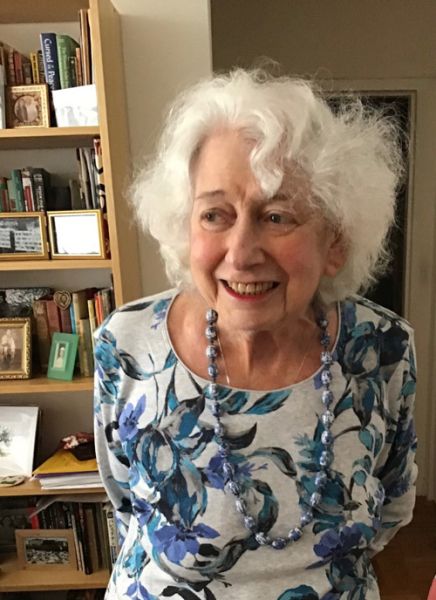Ellen Siegel: An Eyewitness to the Sabra Massacre Shares Her Story
Published on March, 50 2024
Ellen Siegel and Ghada Karmi outside the Israeli Embassy in London in 1972; Credit: Ellen Siegel
By Leni Villagomez Reeves and Ellen Siegel
March 2024
Ellen Siegel, a Jewish-American nurse and activist in Israeli-Palestinian, Jewish and Palestinian solidarity projects was the most recent guest at the Jane Addams Branch WILPF meeting on February 21. She worked as a nurse in the Sabra refugee camp in Beirut during the massacre at Sabra and Shatila and testified before the Kahan Commission (formally known as the Commission of Inquiry into the Events at the Refugee Camps in Beirut) in Jerusalem. She is on the Advisory board of American Near East Refugee Aid (ANERA) and is a supporter of the National Institution of Social Care in Lebanon. Her focus is justice, peace and freedom for the people of Palestine.
Ellen described her experience of growing up in an atmosphere that presented Israel in a wholly positive light, an experience many of us shared, since that was the prevailing US view, even on the left. In her own words, she described how her views on Israel later changed.
“I’m in the Washington Branch of WILPF and I’m a Jewish-American. I was born within days of when Anne Frank went into hiding. I grew up in a holocaust/post-holocaust era. I went to Hebrew School, I had a Bat Mitzvah and I went to a Jewish school of nursing. So I have a very firm understanding of the history of my people. In the late 60s, like most of us, I was active and I had never met an Arab, much less a Palestinian.
“In the early 70s, I traveled to Europe, and I needed some medical attention, and I decided to go to the American University of Beirut Hospital. When I was in Beirut, I started to ask questions about the Palestinians. I was taken to a refugee camp called Burj al-Barajneh. When I was in the camp, I met with an old man who had been exiled from his home in 1948 and I heard from him the story of the Palestinians – how he had lost his home, his land, his orchards. And, in my heart I've never left that hospital room.
“I was in this camp during the Munich incident, if you all remember that, and Israel bombed the south of Lebanon in retaliation for the killing of Israeli soldiers, which the Palestinians did not do. The Germans did. I volunteered my nursing services to the Lebanese Red Crescent, and I went to the south of Lebanon. While I was there I saw incredible destruction that the Israelis had inflicted on the villages. After, I spent several months in Lebanon and I tried to learn as much as I could about the Palestinians.”
Ellen then went to Israel and worked on a kibbutz for several months, where she “started to learn about the discrimination of many Israelis towards the Arab population”. She then went to London, where she joined an anti-Zionist Jewish group and a Palestinian solidarity group.
“One of our demonstrations was in front of the Israeli Embassy and the Jewish people in the group decided to give up their ‘right of return’. As a Jew, I have a right to return to Israel. Any Palestinian who was born in Israel is not allowed to return, and so we had a demonstration.”
 Ellen shared a photo from the demonstration. On the left is Ghada Karmi, whose family was forced to leave their Jerusalem home when she was 8, when Israelis took their house in 1948. Her family was one of hundreds of thousands of Palestinians forced out by Zionist militia attacks. Over 80% of the population in what became Israel, or 750,000 Palestinians, were permanently displaced, and thousands were killed. Ghada became a physician, then an academic and author, always dedicated to freedom and justice for Palestine. The friends have kept in touch and they have done similar demonstrations in the 20-plus years since. “Nothing essential has changed,” said Ghada in an interview with Janet McMahon for the Washington Report on Middle East Affairs.
Ellen shared a photo from the demonstration. On the left is Ghada Karmi, whose family was forced to leave their Jerusalem home when she was 8, when Israelis took their house in 1948. Her family was one of hundreds of thousands of Palestinians forced out by Zionist militia attacks. Over 80% of the population in what became Israel, or 750,000 Palestinians, were permanently displaced, and thousands were killed. Ghada became a physician, then an academic and author, always dedicated to freedom and justice for Palestine. The friends have kept in touch and they have done similar demonstrations in the 20-plus years since. “Nothing essential has changed,” said Ghada in an interview with Janet McMahon for the Washington Report on Middle East Affairs.
Above: Ellen Siegel; Credit: Courtney Asker, used with permission
Ellen said she then “came back to the United States and joined Palestinian solidarity groups.” After Israel invaded Lebanon in 1982, she volunteered to go to Beirut as a nurse for the Palestinians. She was assigned to Gaza Hospital in the Sabra refugee camp and was there for the massacre.
“I volunteered to go to Beirut in 1982 after Israel’s invasion of Lebanon because I wanted to help the Palestinians, and Israel was not speaking in my name. The massacre in Sabra and Shatila from September 16-18 of 1982 involves three countries… the United States, Lebanon, and Israel. The president-elect of Lebanon, Bachir Gemayel was assassinated. Israel launched an attack on Beirut on 15 September and sealed it off so no one else could leave.
“Following the assassination, the Israelis surrounded the entire refugee camp with tanks and soldiers. They would not let anybody out and they would not let anybody in except the Phalange. The Phalange are a Lebanese Christian Militia, who are the sworn enemy of the Palestinians, and Israel decided that they wanted to get rid of any Palestinian fighters who were still in the camp. The Phalange came in and they started to kill people; they started to massacre people, but in the most horrendous way with axes and knives.
“The Israelis shot flares into the air. One of the other physicians and I went up to the roof of the hospital and we saw flares going into the air, followed by gunfire. What was happening was it lit the way for the Phalange to go door to door and kill people. This went on for two days.”
She made it clear that the Israeli army controlled entrance and egress absolutely. They shot flares to light the way. The bulldozers that pushed dirt over the bodies of some 3,500 Palestinian and Lebanese civilians were marked in Hebrew letters. The Israeli commanders were overseeing all this from their command posts and, as the Phalangists were marching the volunteer doctors and nurses at gunpoint to a wall to be shot, Israeli forces intervened. “From the Israeli Forward Command post, they saw what the Phalange were doing and said ‘We can't be killing white people, all these Norwegians and Swedish and Americans'.
"I believed in what I was doing. I believe my being there was the right thing to do. That my taking care of these patients was the right thing to do. And if I had to die alongside the Palestinians, it was okay."
After the massacre, Ellen volunteered to go to Jerusalem to testify before the Kahan Commission of Inquiry, led by judge Aharon Barak.
“[Aharon Barak] is now the Israeli judge on the International Court of Justice [ICJ] in the Hague, which is kind of interesting. He whitewashed the whole Sabra and Shatila Massacre and it seems he whitewashed the whole ICJ also.”
Ellen says she has visited Beirut in September every year for the past 15 years to commemorate those that died.
“And here we are in 2024, and I'm looking at what's happening in Gaza, and the pain and suffering that's going on and the amputations with no anesthesia, the starvation, the lack of water, the lack of food, the most pathetic pictures I have ever seen in my life of these children under the rubble. The bread that they, these little children, are trying to eat is a flat, round, brown thing. It's made up of grass and animal feed. There are trucks waiting to go in there, and they're being blocked. And there are Israeli demonstrators that are standing there demonstrating against having any of these trucks come in and the Israeli Defense Force is allowing that to happen. There's a cultural genocide going on there. They have completely flattened Gaza — all of the mosques, schools, the universities, everything is gone. There's nothing left.
“And so it's very important that we keep up. What people have to keep doing is supporting the BDS [Boycott, Divest, Sanction] movement. Keep the demonstrations going. Keep up the phone calls.
And hopefully, this nightmare will end soon.
“The reason I do this is because I learned as a child that if you are aware that if something bad is happening to people, you must speak up. That this is the moral and right thing to do…very simply.”
Take Action
For a Ceasefire:
- www.codepink.org/indefensible
- www.amnesty.org/en/petition/demand-a-ceasefire-by-all-parties-to-end-civilian-suffering/
- www.change.org/p/sign-and-share-this-urgent-petition-calling-for-a-ceasefirenow-in-gaza-and-israel
Boycott, Divest, Sanction:
Humanitarian Aid to Palestine:
- ANERA https://www.anera.org/where-we-work/palestine/gaza/
- United Palestinian Appeal https://upaconnect.org
- The National Institution of Social Care and Vocational Training (NISCVT), known as Beit Atfal Assumoud (BAS), Beirut www.socialcare.org/portal/home/1/
Learn more:
- www.middleeasteye.net/video/eyewitness-ellen-siegel-recalls-horror-sabra-and-shatila-massacre
- https://electronicintifada.net/people/ellen-siegel
- https://mondoweiss.net/2021/09/american-survivor-of-sabra-shatila-massacre-has-spoken-out-for-39-years/
- https://www.middleeasteye.net/users/ghada-karmi



